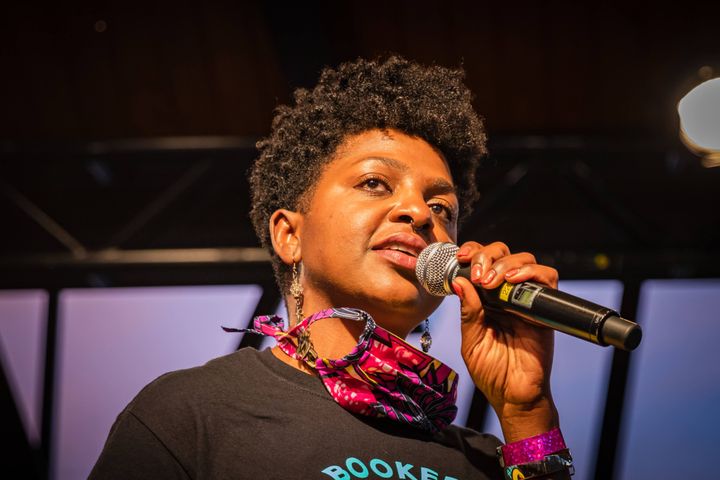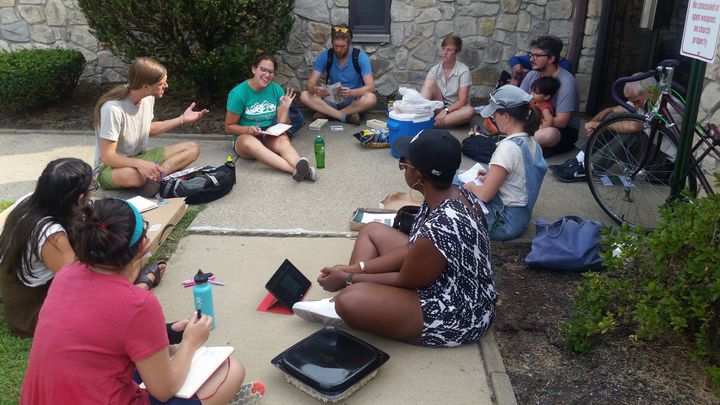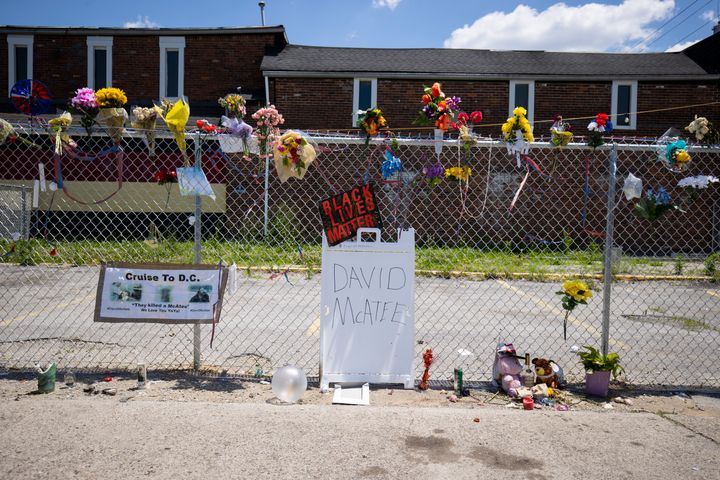[ad_1]
Cassia Herron fumed as she watched an armored SWAT vehicle idle in the parking lot across from David McAtee’s barbecue stand in Louisville, Kentucky. It had only been four days since city police and National Guardsmen had fatally shot McAtee while enforcing a curfew during protests sparked in part by the March killing of another Black Louisville resident, Breonna Taylor. The city was raw with anguish.
McAtee was a fixture in Louisville’s West End, who worked for years as a cook at a local homeless shelter and was known for giving away food to customers at his restaurant who couldn’t afford to pay. People in West Louisville don’t need armored police intimidating residents, said Herron, a local entrepreneur and community advocate; they need the city to prioritize their health and well-being. They need grocery stores.
In the past five years, more than a dozen grocers have abandoned the city. In West Louisville, a cluster of predominantly Black neighborhoods pocketed between a revitalizing downtown and the deep Ohio River, their exit has left behind a nutritional wasteland. The area is a food desert, though Herron takes issue with that term. A desert is something natural, she said. “The conditions of our neighborhoods are not natural, they’re intentional.”
As Taylor and McAtee’s names continue to echo across the country alongside calls to defund police and invest in Black communities, Herron is continuing a decades-long fight against injustice at the plate level. In Louisville, a sharply segregated town built with old money reaped from slave-powered tobacco plantations, tens of thousands of Black residents can’t afford healthy food or can’t get to a place that sells it. To Herron, systemic reform begins with addressing food insecurity.
A “country girl who grew up in the city,” she earned her master’s in urban planning from the University of Michigan, then returned to Louisville where she has spent 20 years in what has often been a frustrating search for ways to feed her community. City priorities have shifted with each new administration; neighborhood food councils have been formed and disbanded; inspiring projects have started, sputtered and stopped. All the while, Herron has pushed for a cooperatively owned, affordable market that sells Kentucky and Indiana-grown produce. It would be the only such store in Louisville, and she calls it the Louisville Community Grocery.
It would be open to everyone, but co-op members who pay a fee based on their income — $150, or $25 for senior, youth and low-income members — would receive a discount and have a say in how the store is managed. They would elect a board that hires a general manager and weigh in on what gets stocked. Once the store turns a profit, members would collectively decide whether to pocket the money or reinvest it into other neighborhood co-ops, support a youth sports team, fund a scholarship or help seniors repair their homes. In Herron’s vision, kids on scooters deliver food to elderly residents who can’t access the store, and the co-op’s doors open onto the sidewalk and an accessible bus stop — not a football-field-sized parking lot.
The dream is to rebuild our economy based on cooperation and not competition.
Cassia Herron
Herron incorporated the co-op in June 2019 and assembled an eight-member board of directors. In January, the group completed a retail analysis of four potential locations for a planned 10,000-square-foot store, which would sell “basic items at budget prices,” local and organic produce, meat and prepared foods. The co-op has so far signed up a little more than 100 members, but outreach at farmers markets and monthly meetings at the library have not been as fruitful as Herron hoped; she needs 2,000 dues-paying members to finance the rest of the planning, construction, hiring and opening.
“The dream is to rebuild our economy based on cooperation and not competition,” she said. And why not? “Corporate grocery stores are leaving our communities; there’s a business case for that. Family Dollars are opening; there’s a business case for that. And co-ops are opening in urban communities across the country; there’s a business case for that.”
The roots of West Louisville’s food inadequacies date back as far as the 1950s, when middle class residents fled the city for the quiet suburbs, taking their dollars and family-owned businesses with them. It has accelerated more recently with the national rise of corporate retail chains which have pushed the industry toward superstores that sell everything from lettuce to televisions and are slinking to the outskirts of towns in search of floor space.

“Grocery stores are low-margin businesses and decisions to close are based on their individual profit metrics,” said Caitlin Bowling, communications manager for the city’s economic arm, Louisville Forward, who noted that shifting consumer habits have encouraged large retailers to focus on online sales and delivery.
As the retail giants have moved out of West Louisville, many people are stranded more than a mile or two from a market that offers fresh produce and meat. That might not be a problem in the vehicle-rich suburbs, but in parts of West Louisville, nearly 30% of households that are more than a half-mile from a supermarket also don’t own a car, according to the USDA. There are plenty of food marts and convenience stores, but these typically stock non-perishable canned goods, bags of chips, soda, beer, toiletries and lottery tickets.
Broadway, West Louisville’s main east-west artery, offers nearly 20 fast food restaurants and one remaining full-service grocery store, a Kroger. Given the recent closures of other stores — a Kroger several miles south, another near Spalding University to the east, a family-owned grocer up north and an independent market that had been in business downtown for more than 70 years — the Broadway Kroger has become more than just a grocery store; it’s a lifeline.
“We hold our breath every day, because there’s a chance that it will close before we can open our co-op,” Herron said.

As president of the Louisville Association for Community Economics (LACE), Herron’s envisions the co-op sitting at the center of a circular supply chain that builds wealth in a community where the local poverty rate of 40% is nearly three times higher than the regional poverty rate.
Get outside Louisville and its encircling tract housing, and the Kentucky landscape spreads out into farmland. Historically, the state was thick with tobacco, but in the past 20 years it has labored to transition to hemp, corn, soy and other crops. Today, Kentucky raises more cattle than any state east of the Mississippi, but Herron rarely sees local beef in local stores. By building relationships with the region’s farmers, she intends to stock the market with products grown nearby.
“In order for the grocery store to be successful, it needs to do business with other businesses that have the same values,” she said.
The city hasn’t necessarily shared this vision. Herron has applied each of the last four years for $50,000 in city assistance to help hire a single LACE staff member who would build up membership to get the co-op started. The award has never been granted.
“Food access hasn’t been a focus of the city for years,” said Karyn Moskowtz, who directs New Roots, a food advocacy organization that runs pop-up, affordable produce markets in some of the city’s least food secure neighborhoods. “They’ve focused on gun violence, needle exchange and vaccinations.”
Development of a full service grocery store where there aren’t any is the biggest thing you can do to make progress on food access.
Brandon Coan, Louisville City Council
Under Mayor Greg Fischer, whose campaign commitments to supporting local food systems had once given Herron hope, the city had plans to build an indoor food court and regional farmers market with an indoor growing operation in West Louisville, but the project fell through and has been replaced with a $50.5-million indoor track and field facility. Broadway almost landed a Walmart in 2016, which would have brought fresh produce, but the deal disintegrated. (A YMCA is being built instead.)
Using federal funds, the city has tried to subsidize new stores, but success has been rare. “Because groceries in America are part of the capitalist system, supply and demand won’t always bring a grocery to every neighborhood,” Bowling said. “So, local government and economic development organizations have to subsidize grocery locations and operations.” The city has invested in community nonprofits, including New Roots; helped start a community garden; and partially funded a partnership between Kroger and a local food bank to operate a mobile market.
But a mobile market is a far cry from a well-stocked neighborhood grocery with reliable hours. And while the city seems all too eager to invest in multimillion-dollar development projects downtown, Herron said, it has been reluctant to buy into the community-driven cooperative model — a hesitancy that hasn’t gone unnoticed in West Louisville.
“It’s felt like we’ve been in competition with local government,” she said.
Perhaps the most significant obstacle Herron has faced is convincing her neighbors that they can be owners — of a co-op, or of anything. Building the co-op’s membership hasn’t been difficult because locals don’t have the $25 needed to buy in, she said, “it’s because people don’t believe they have a role. It’s us believing in ourselves that we have the social capital, the intelligence, the innovation to do it.”
“I’m not a business owner, I don’t even own my own car. I’m a Black woman who doesn’t own shit,” she said.

Nearly three weeks after police shot McAtee across the street from the only grocery store remaining on Broadway, and more than 100 days since Taylor’s murder less than three miles away, Herron’s efforts finally bore fruit. On June 25, the city’s Center for Health Equity, under the Department of Public Health and Wellness, earmarked a $3.5-million bond “to support the development and operation of a grocery in an area underserved by existing operations, to promote job creation and community health.” The money hasn’t been allocated yet, but Herron expects to receive enough to begin opening the Louisville Community Grocery.
The city has known about the food insecurity problems in West Louisville for years, said City Councilman Brandon Coan, and “has made modest but inadequate investments to improve access.” This substantial and sudden allocation has been driven in large part, he said, by pressure from Black Lives Matter protestors who have occupied Jefferson Park (dubbed Injustice Park) across from city hall for three weeks and called on the city to defund police.
Coan, who worked on food justice issues for Mayor Fischer’s first campaign, said the new city budget includes several bonds aimed at addressing systemic issues affecting underserved neighborhoods, and the grocery store is a centerpiece investment.
“Development of a full service grocery store where there aren’t any is the biggest thing you can do to make progress on food access,” Coan said.
Herron is well aware that a grocery store isn’t going to bring justice for Taylor’s killing, nor answer calls to defund the police, but it’s something. “We recognize that this long overdue investment comes to us as a result of the tragic loss of Black lives,” LACE posted to its website in response. “We carry this project forward in memory and honor of Breonna Taylor, David McAtee, and thousands of other victims of racism and police brutality.”
By the end of the year, Herron intends to have a business plan for two locations. There is no shortage of empty buildings in West Louisville, so securing space shouldn’t be a problem. But there is still that other obstacle to overcome: ownership — of food, of property, of a community’s outlook.
For more content and to be part of the “This New World” community, follow our Facebook page.
HuffPost’s “This New World” series is funded by Partners for a New Economy and the Kendeda Fund. All content is editorially independent, with no influence or input from the foundations. If you have an idea or tip for the editorial series, send an email to thisnewworld@huffpost.com.
Calling all HuffPost superfans!
Sign up for membership to become a founding member and help shape HuffPost’s next chapter
[ad_2]
Source link

